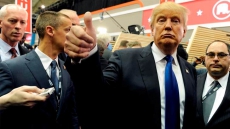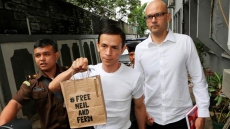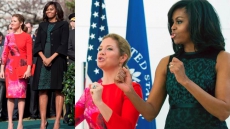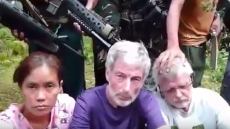ATLANTA — Republican presidential primary leader Donald Trump says he will consider paying the legal fees of a North Carolina man captured on video sucker-punching a protester at one of the billionaire's signature mass rallies.
"I don't accept responsibility. I do not condone violence in any shape," Trump told NBC's "Meet the Press" on Sunday.
But when asked whether he'd financially back the supporter, who was arrested and charged with assault, Trump says he's "instructed my people to look into it, yes."
Trump, meanwhile, rejected calls to modify his campaign rhetoric amid increasing instances of violence at his events. Instead he blamed Democratic candidate Bernie Sanders for sending supporters to disrupt Trump events and noted that many of the protesters who clashed with Trump supporters in Chicago on Friday night carried Sanders signs.
Sanders on Sunday vehemently denied Trump's accusations.
"To suggest that our campaign is telling people to disrupt his campaign is a lie," Sanders said Sunday on CBS' "Face the Nation."
Trump said his rallies are "peaceful," and accused news reports of exaggerating the violence. He demurred on multiple Sunday talk shows when reminded of his litany of incendiary statements: he'd "punch" a protester "in the face," ''we need a little bit more of" hitting back and encouraging the crowd to "knock the crap out of" protesters.
On several Sunday talk shows Trump said in one instance, he was simply defending himself against the possibility of being hit by a tomato, which he insisted could do "real damage" if hurled by someone "with a strong arm." There have been no reports of a tomato being hurled at any Trump event or of one hitting the candidate.

Trump has rallies scheduled Sunday in Illinois, Florida and Ohio ahead of Tuesday primaries that likely offer GOP rivals their last shot to derail Trump from reaching the 1,237 delegates required for the Republican nomination.
The GOP leader's rivals — in both major parties — are more vocal in their criticism of Trump's rhetoric, calling it dangerous and divisive, from calling Mexican immigrants "rapists" and "criminals" to his repeated cracks about "punching" protesters and taking them "out on a stretcher."
Florida Sen. Marco Rubio, a distant third in the GOP delegate count, compared Trump to third-world "strong men," and said the tone of the campaign "is really going to do damage to America."
Rubio said on CNN that Trump is arguing to voters: "Don't put your faith in yourselves. Don't put your faith in society. Put your faith in me."
On the Democratic side, Sanders said on CBS' "Face the Nation" that he has "millions of supporters," some of whom "will do what they do." Sanders said on CNN that Trump "is a man who keeps implying violence, and then you end up getting what you see."
On the possibility of paying legal fees for his North Carolina supporter, Trump says he wants "to see the full tape" before deciding whether to back John Franklin McGraw. Trump suggested McGraw, who is white, punched Rakeem Jones, who is black, after Jones held up his middle finger to the crowd.
McGraw "got carried away," Trump said on NBC's "Meet the Press," but "frankly wants to see America made great again."
Video of the immediate moments before McGraw threw the punch does not show the "taunting" from Jones that Trump describes.
Jones has told The Associated Press that he and others went to the event as observers, not protesters. He says someone swore at one in their group, and by the time they tried to object, the police were escorting him out.

Trump appeared intent Saturday not to draw criticism for instigating any problems.
At a morning rally in Ohio, he was suddenly pulled midspeech into a protective ring of U.S. Secret Service agents after a man rushed the stage.
"Thank you for the warning," Trump told the crowd after he resumed his speech. "I was ready for 'em, but it's much better if the cops do it, don't we agree?"
PROTESTS AT TRUMP RALLIES ROIL REPUBLICAN PRIMARY CAMPAIGN
CLEVELAND — Angry confrontations at Donald Trump's campaign rallies have further roiled a raucous primary campaign just ahead of Tuesday's make-or-break contests in five states that offer perhaps the last chance to derail the billionaire's march toward securing the Republican presidential nomination.
In a Republican presidential primary filled with extraordinary moments, a 24-hour stretch that began Friday night stands above them all.
Protesters were so committed to keeping Trump from speaking in Chicago that they clashed with supporters, forcing the Republican front-runner to abruptly cancel his rally before it even began.
The next morning, two of the candidates still fighting to defeat Trump, Florida Sen. Marco Rubio and Ohio Gov. John Kasich, said they were so disgusted by the chaos that they may not support the billionaire businessman if he clinches their party's nomination.

And when Trump appeared at another rally Saturday morning in Ohio, he was suddenly pulled midspeech into a protective ring of U.S. Secret Service agents charged with guarding his life after a man leapt over a barrier and rushed the stage.
"Thank you for the warning," Trump told the crowd after he resumed his speech. "I was ready for 'em, but it's much better if the cops do it, don't we agree?"
Each moment has virtually no precedent in modern presidential politics. Taken together, they exposed anew the remarkable anxiety ripping through a country dealing with profound economic and demographic changes, as well as the anger roiling inside one of America's great political parties.
For those cringing at the discord and Trump's unanticipated political rise, there were no easy answers Saturday.
Republican traditionalists kept whispering in private conversations about long-shot options for stopping Trump, either at a contested convention or by rallying around a potential third-party option. Trump, meanwhile, could put the Republican nomination out of reach to others in Tuesday's slate of primaries in five states, including Florida and Ohio, which offer a rich cache of delegates to the party's national nominating convention.
Trump's rivals have spent months tiptoeing around his provocative comments for fear of alienating his impassioned supporters. Even in Thursday night's debate, all three of his remaining rivals — Rubio, Kasich and Texas Sen. Ted Cruz — sidestepped a question about whether outbursts of violence at Trump's rallies and his statements encouraging supporters to aggressively take on protesters concerned them.

But the images spilling out of Chicago, with young people angrily confronting each other, often divided along racial lines, appeared to be too much.
In an interview with The Associated Press, Rubio said he may not be able to support Trump if he's the Republican nominee, citing the way he's "dividing both the party and the country so bitterly."
The Florida senator wouldn't say whether he'd look for a third-party candidate to support if Trump does become the Republican standard-bearer, but added, "The fact that you even have to ask me the question shows why (Trump) is a problem."
Kasich, who has largely avoided tangling with Trump until now, said the real estate mogul has created a "toxic environment" that makes it "extremely difficult" to envision supporting him as the Republican nominee.
"To see Americans slugging themselves at a political rally deeply disturbed me," Kasich said while campaigning in Cincinnati. "We're better than that."
Only Cruz, who is closest to Trump in the delegate count, said he would unequivocally support the businessman if he emerges from the primary victorious. Still, Cruz — eager for Rubio and Kasich to get out of the race after their home-state primaries on Tuesday so he can take Trump on in a head-to-head contest — blamed his rival for encouraging the kind of "nasty violence" that occurred in Chicago.

President Barack Obama, speaking at a Democratic fundraiser in Dallas, said those who aspire to lead the country "should be trying to bring us together and not turning us against one another," and he urged leaders to "speak out against violence."
"If they refuse to do that, they don't deserve our support," he said.
With his delegate lead mounting, there's little evidence that Trump sees any reason to alter an approach that includes encouraging his supporters to aggressively — and sometimes physically — stop protesters from interrupting his raucous rallies.
Instead, Trump said at a rally Saturday afternoon in Cleveland, which was also interrupted several times by dozens of protesters, that he thought all the disruptions would help him.
"It just makes all of our friends and supporters more angry. We're going to go to the polls on Tuesday," he said, predicting a "resounding victory."
Trump appeared eager to paint himself as the victim of the extraordinary events. He complained the well-organized protesters in Chicago intent on keeping him from speaking had violated his constitutional right to freedom of speech, and questioned why no one was asking Bernie Sanders to defend the actions of his backers.
Several of the protesters in Chicago said they are supporters of the Democratic candidate.
"They're Bernie fans!" Trump said in Cleveland. "Hey, Bernie, get your people in line, Bernie!"
Sanders responded with a statement denouncing Trump as a "pathological liar" and said his campaign did not organize the protest at the cancelled Chicago rally.

Democratic front-runner Hillary Clinton, campaigning in Missouri, said she found the unrest at Trump's Chicago rally "deeply disturbing." .
Speaking to a largely African-American group of campaign volunteers in St. Louis, Clinton called on voters to stand up to "this tide of bullying and bigotry and blustering that is going on in our political strategy."
"If you play with matches, you're going to start a fire you can't control," she said.
FACING LONG PRIMARY SLOG, CLINTON ALLIES FEAR HELPING TRUMP
CLEVELAND — When Hillary Clinton dueled with Barack Obama for the Democratic nomination in 2008, a tough primary slog eventually yielded to a largely unified party. The future president said the process ultimately made him a stronger candidate and he later persuaded Clinton to become his secretary of state.
Eight years later, Clinton is yet again engaged in a lengthy primary process that seems all-but-certain to stretch well into the spring. But how her battle against rival Bernie Sanders positions her for what's widely expected to be an ugly fall election remains far less clear.

While Clinton aides insist there's little they will do to push Sanders out of the primary race, they are beginning to show signs of impatience with the increasingly negative nature of his campaign.
"We would like to wrap it up as soon as possible," said communications director Jen Palmieiri, just hours before Sanders won the Michigan primary. "You don't want to let them have a head start on the general."
Clinton and her allies had hoped to switch much of their focus to the general election after Tuesday's primary contests, a plan thrown into doubt after her loss in Michigan last week. Democratic strategists wanted to use the spring to settle on early lines of attack against Trump, a brash billionaire who's successfully deflected nearly all Republican efforts to undermine his candidacy. And top donors had expected the campaign to begin raising money for the general election beginning in April, a transition they now say has been pushed off.
But aides say contests in Ohio, Missouri and Illinois look tighter than they did just days ago, forcing them to keep focus on the primary despite a sizable advantage among the delegates that determine the nomination.
Wins on Tuesday would give Sanders fresh momentum in the contest, granting him months to continue criticizing Clinton's positions on issues that Republican front-runner Donald Trump wants to put front and centre in the general election.
Some Clinton allies worry that messages from Sanders' campaign — demands that Clinton releases transcripts of her paid speeches to Wall Street banks, her past support for trade deals and his argument that most Washington politicians are bought and paid for by campaign contributions — could aid Trump in the general election. Sanders and his supporters are also making a similar case against Clinton backers with ties to Wall Street, expanding his critique to a broader swath of the party.

At a Saturday press conference in Chicago, Sanders charged Chicago Mayor Rahm Emanuel, a long-time Clinton ally, with being "indebted to Wall Street and big money interests."
Those are lines of attack already being tested by Trump, who's increasingly turning his focus to the general election — and a potential campaign against Clinton.
"She's not going to bring back trade, she's not going to bring back businesses," said Trump, in an interview with CNN.
Clinton carries an edge of more than 200 pledged delegates into Tuesday's primary contests in Florida, Ohio, North Carolina, Illinois and Missouri and could effectively foreclose Sanders' path to victory with a sweep of the large states. While the delegates will be awarded proportionately, Clinton's support with so-called "superdelegates" — elected officials and party leaders free to back whomever they'd like — puts her in a strong position to win the nomination.
According to an Associated Press analysis, Clinton holds 1,231 of total delegates, more than half the amount needed to clinch the nomination. Sanders has 576.
Clinton's team argues that once Sanders lost the delegate lead, it became very difficult to regain control of the race because delegates are awarded proportionally.
Then, Clinton stayed in the race until the bitter end, buoyed by popular wins in nine of the final 16 contests. But senior strategist Tad Devine says he sees no scenario where Sanders gets out before the party convention in July — and he's got the money to keep going until spring, having reportedly raised more than $42 million in February.
"If he's not the nominee, then I think Hillary will benefit as did Barack Obama when she challenged him all the way to the end," said Devine.
Clinton aides involved with Obama's election effort said the long primary contest helped their campaign by forcing them to establish operations in every state.

"If you would have asked us in June how we felt about it, as opposed to earlier on in the process, I think we would have said there was a benefit to it," said Joel Benenson, a senior strategist for both Obama and Clinton.
Some Clinton backers worry that Sanders, long a self-identified independent, won't feel the same obligation to support the party the way Clinton claims to have done for Obama in 2008.
"It wasn't easy to convince a lot of my supporters to immediately move to supporting Senator Obama but I made the case," she said in a Fox News forum in Detroit. "When you get through a primary, despite the emotions that are engineered in your supporters, you have to take stock of where you are and who is running on the other side."
She's also been sharpening her economic message to try and address an angry electorate frustrated with what they see as an economy recovery that's left much of the country behind.
"Her experience — with due respect to both Senator Sanders and Mr. Trump — is one of being able to be tough, stand up, to go toe-to-toe with the Chinese," said campaign chairman John Podesta. "That's what the American people need in the Oval Office."




